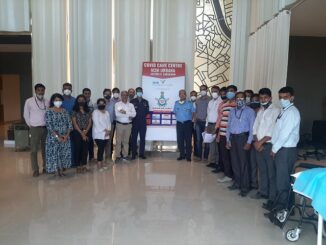Rajkot: Gujarat’s Rajkot-based Marwadi University (MU) has received the prestigious ‘One District One Green Champion’ award conferred by the Mahatma Gandhi National Council of Rural Education (MGNCRE), Ministry of Education, for the district of Rajkot. As a proud recipient of this ‘swachhta’ award, especially during Covid-19 times, the University reaffirms its commitment to sustainability and impactful environmental advocacy.
Prof. (Dr) Sandeep Sancheti, Provost, Marwadi University says, “A ‘green campus’ and sustainability-oriented curriculum is a priority area for Marwadi University. Here, environmental issues are integrated into student life through both extracurricular activities and academics, whether that’s in their coursework, dissertations or work placements. As a step ahead, the University also offers degrees in sustainable agriculture and environmental engineering. It’s not just about looking to reduce carbon footprint and increase recycling initiatives. As a truly sustainable institution, we are also looking at its impact on the wider community.”
Speaking on materialising a cleaner and greener world, Jeet Marwadi, Trustee, Marwadi University says, “The On-campus Marwadi University Innovation, Incubation, and Research Centre (MUIIR) have signed MOUs with Energy Swaraj Ashram, GUJCOST, and T-HUB. It is a strong step in encouraging a sustainable environment through start-ups and entrepreneurship.
Incidentally, MU is the first university to house the Energy Swaraj Ashram, a solar incubation centre based on the Gandhian ‘Gram Swaraj’ model, that will help the University generate, nurture and promote young entrepreneurs in the energy sector.
As a stakeholder entrusted with preparing tomorrow’s leaders, the University is working on energy and natural resources conservation through the installation of a 550 kW solar rooftop plant, an in-house water purification plant, and a water harvesting system. It is keenly pursuing a project on developing low-cost homes focusing on renewable energy and sustainable architecture.
MU has also designed a course in agricultural science to impart knowledge on sustainable precision farming and smart agriculture. The curriculum comprises the study of agronomy, horticulture, plant pathology and plant breeding and agriculture management, and is supplemented by field visits and experiential learning.
Recently, the University also signed an MoU with ASSOCHAM Council for ‘Green & Eco-friendly Movement’ – which complements India’s sustainability movement and takes it to the next level by promoting environment-friendly green building design and construction.
As part of a future strategy to build a sustainable campus, MU plans to promote classes specialising in or relating to sustainability, as an addition to existing environmental awareness drives engaging them in the discourse of environmental advocacy.




